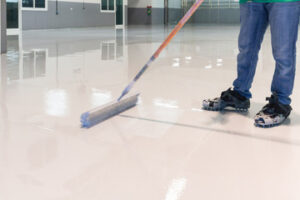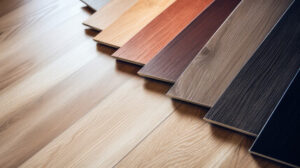Epoxy Flooring Charles Town WV is a popular choice for commercial and industrial spaces. This type of flooring is highly durable and offers resistance to impact, slippages, high temperatures, and chemical spills.

There are several different types of epoxy floor coatings available in the market. Avoid water-based and cycloaliphatic epoxy products, they will dull your floor and wear out in no time.
Epoxy floors are easy to clean and maintain once you know the proper procedures. Most of the time, you can simply sweep or vacuum the floor to remove any loose particles that have accumulated over time. For a deeper cleaning, you can mop the floor with a mild cleaner that is safe for epoxy floors. It is recommended that you avoid harsh chemicals and abrasive cleaners, as these can damage the epoxy coating.
Chemical spills, especially those from abrasive or corrosive substances, should be cleaned up immediately as they can be more than just unsightly stains. If left unattended, they can erode the surface of the epoxy coating and eventually cause it to break down or become uneven. The best thing to do if you have a chemical spill is to wipe it up using paper towels and then wash the area with a commercial degreaser, such as Simple Green. If you need to use a power washer, it is recommended that you use one that is safe for epoxy floors and does not contain any citrus or vinegar solutions as these can also damage the floor.
For regular maintenance, it is recommended that you sanitize your floor on a weekly basis. However, depending on the amount of traffic the floor receives, it may need to be scrubbed more frequently, particularly in high-traffic areas. If you scrub the floor with a brush, make sure to use a deck brush that is suitable for epoxy flooring, as hard bristle brushes can scratch the surface of the epoxy coating.
In addition to regularly scheduled scrubbing, it is important to have mats placed at entryways and exits of your building, as this will prevent the tracking of dirt and moisture from entering the space and damaging the epoxy floor coating. Aside from that, regular sweeping and mopping with a pH-neutral cleaner will keep your epoxy floor looking great and prevent damage over time.
Slip Resistant
Epoxy floors are a growing trend for homeowners as they look more attractive than bare concrete and are easy to clean. They’re also a great choice for industrial settings and are highly resistant to spills, stains, abrasions, and damage from cars. However, some people are worried about the slip-and-fall risk associated with epoxy flooring, especially when it’s wet.
It’s important to know that epoxy floors can be made slippery when covered with moisture, and this is a serious safety issue. Luckily, there are materials that can be added to an epoxy floor coating to make it non-slip. These materials will usually add to the cost of the floor, but they’ll also ensure that you don’t slip and hurt yourself on the surface.
One popular option is shark grip, an aluminum oxide additive that can be added to the top coat of your epoxy floor. It forms a rough texture on the surface of your floor that gives you something to grab onto when your feet are wet. It’s also relatively inexpensive, making it a good choice for commercial and industrial spaces.
Another solution is anti-slip grit, which can be mixed into the topcoat of your epoxy floor to create a bumpy texture. There are several different types of anti-slip grit, including silica sand, pumice, colored quartz, and polymer grit. The downside is that these abrasive materials will detract from the high-gloss finish of your epoxy floor.
If you’re concerned about slip-and-fall risks in your home or business, consider hiring a professional Detroit epoxy floor company to apply a non-slip grit layer to the floor. They’ll be able to help you choose the right additive for your space and apply it properly.
Easy to Maintain
Epoxy is a non-porous material that makes it water resistant. That means any chemicals, oils or spills will not be absorbed by the floor and cause permanent damage. This feature makes it perfect for commercial spaces that may encounter spillage or flooding in their facilities.
The epoxy surface is also anti-slip. You can add sand, gravel, polymer grit or aluminum oxide to the epoxy coating to give it an even sturdier grip on shoes and feet. This feature also helps keep staff and clients safe from slips and falls in the facility.
With regular cleaning and inspections, your epoxy floors will look great and last for a long time. Sweep or vacuum the floor on a daily basis to remove any debris, dirt or dust particles that can scratch the surface. If you need to mop the floor, avoid using soap-based cleaners; they can leave a film coating or haze that detracts from the shine of the epoxy. Instead, use an approved cleaning solution that does not contain acids (especially citrus) or vinegar, and mop the floor with a hard foam mop and warm water.
If you notice a stain or spot on the epoxy, clean it promptly to prevent it from etching into the surface of the flooring. Stains and spots are easily removed with a kitchen sponge or pad, kitchen scrubber, or a non-abrasive scrubbing brush. Even rust stains can usually be scrubbed away with a kitchen pad or sponge and a mild cleaner.
For those tougher stains, a concrete degreaser can be used to soak and then scrub the floor. After scrubbing the area, rinse and dry thoroughly. To protect your epoxy floors, consider putting down protective rugs or mats in heavy traffic areas. Additionally, lift heavy furniture rather than drag it to prevent scratches or scuff marks on the surface of your epoxy floor.
Durable
Epoxy is a material that’s durable and hard-wearing, which makes it perfect for areas of heavy foot or machinery traffic. It can withstand impact from vehicles and other equipment, as well as chemicals and spills. It’s also highly resistant to fire, which makes it safer than other types of floor coating.
It’s important to note that epoxy floors require careful preparation before being applied and are best installed by a professional. This includes patching cracks and cleaning the surface to remove any stains. It is also essential that humidity levels are low during the application process to prevent the epoxy from peeling later.
Another benefit of epoxy floors is that they are more affordable than other types of flooring, such as tiles. In addition, they can save you money in the long run with their low maintenance and repair costs. Investing in an epoxy floor coating will also help you avoid the expense of replacing or repairing damaged concrete.
Epoxy floors can be customized to suit any design or style, from sleek and modern to warm and rustic. They look great in commercial settings, as well as residential spaces. They are easy to clean and can be customized with slip-resistant additives for safety. They can also be made to resemble marble, terrazzo, or other stone patterns.
Additionally, you can use decorative flakes and metallic pigments to enhance the visual appeal of your epoxy flooring. This means you can create a unique and memorable look for your space without the cost of buying expensive tiles. These decorative floors can also be used to complement your company’s branding, creating a more professional and cohesive appearance. This makes them a great choice for high-profile areas that want to make a lasting impression on customers and guests.
Affordable
Epoxy is a relatively affordable option when you consider how long it lasts and the ease with which it can be maintained. You can also choose from a wide variety of colors and styles to create a unique look that will complement your home or business. Epoxy floors are easy to keep clean and can be swept or vacuumed to remove dust, dirt, and debris. They can also be easily wiped down with a disinfectant. Epoxy floors are not porous, so spills and splashes will not stain. This is a great benefit for areas that may be exposed to moisture or temperature changes, such as a kitchen.
Commercial and industrial epoxy floor systems are ideal for warehouses, hospitals, airports, and manufacturing facilities. They are extremely strong and durable, and they can stand up to heavy equipment and vehicles without being damaged. They are also bright and reflect light, reducing the need for additional lighting in these spaces. They are easy to maintain, and they offer excellent protection against corrosion.
Typically, these floors cost between $2 and $5 per square foot for materials, depending on the type of epoxy used. A professional will charge more to prepare the concrete and apply the coating, but they are often able to work out of hours, which reduces downtime for your facility or business. They can also handle difficult applications, such as solid epoxy, which is more durable but harder to install.
Another benefit of epoxy is that it can be applied over existing flooring, which can save you money on the installation. However, you should hire a reputable flooring contractor to ensure that your floor is installed properly.
